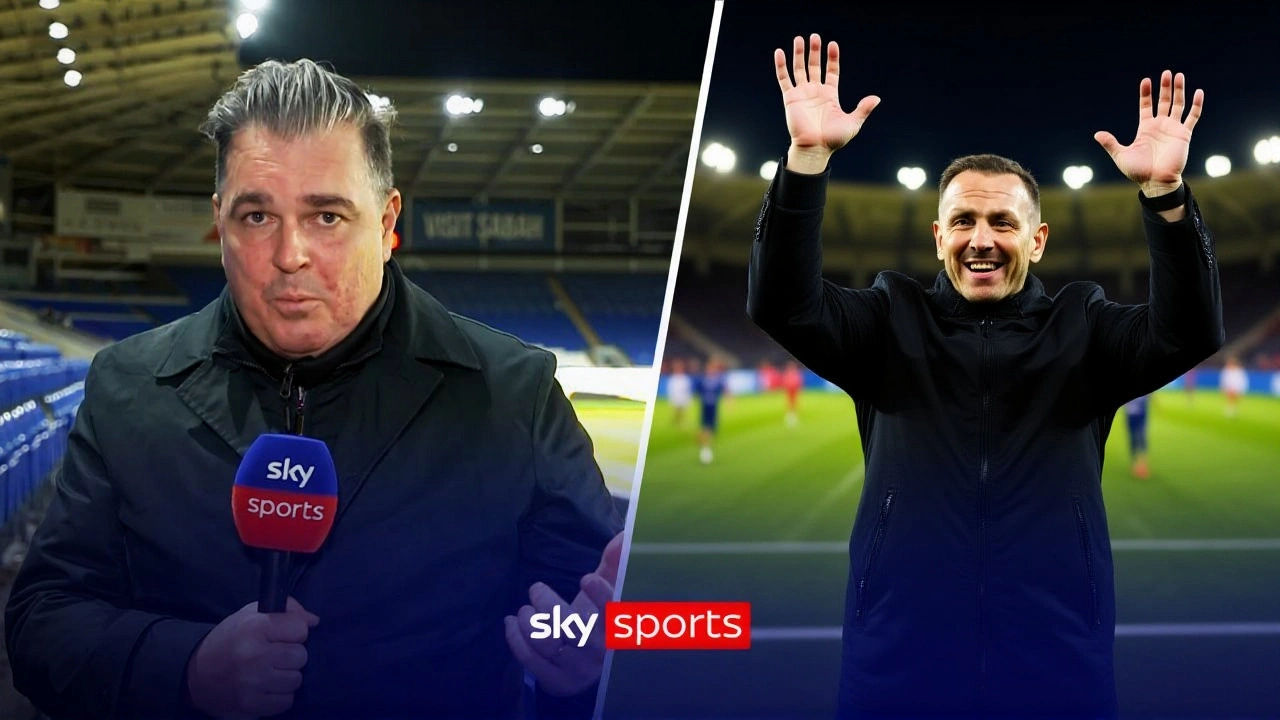Harry Wilson's hat trick powers Wales to 7-1 rout of North Macedonia, secures home playoff semifinal
 Nov, 21 2025
Nov, 21 2025
When Harry Wilson stepped onto the pitch at Cardiff City Stadium on Tuesday night, he wasn’t just playing for Wales — he was captaining it for the first time. By the final whistle, he’d done more than lead. He’d delivered a performance for the ages: a hat trick in a 7-1 demolition of North Macedonia that sent Wales into the 2026 FIFA World Cup playoffs with home advantage locked in. The final scoreline — Wales’ biggest goalscoring haul since 1978 — wasn’t just a result. It was a statement.
A Night That Broke Decades of Doubt
It wasn’t just the goals. It was the rhythm. The confidence. The way Wales played like a team that finally believed it belonged among Europe’s elite. The match, played under a packed Cardiff roof on November 18, 2025, started with nervous energy — but only for a few minutes. Brennan Johnson set the tone with a blistering run down the left, and by the 18th minute, Harry Wilson had buried a penalty after a foul on David Brooks. The crowd roared. The pressure lifted. And then, just three minutes later, Brooks pounced on a cutback to make it 2-0.
North Macedonia responded quickly. Bojan Miovski, their clinical striker, pounced on a rare slip by goalkeeper Karl Darlow to pull one back. But the moment felt like a fluke, not a revival. The Welsh response was immediate. Johnson, the engine of this team, unleashed a curling right-footed rocket from 18 yards in the 37th minute — a goal that silenced every doubter who thought this Welsh side lacked firepower.
Wilson’s Moment, and the Floodgates Open
The second half was pure Welsh domination. Daniel James added a fourth with a darting run and low finish at 57 minutes. Then came Wilson’s masterpiece. A free-kick from just outside the box, curled like a violin note — 75th minute. The stadium shook. Then, eight minutes later, another penalty. This time, no hesitation. Wilson buried it. Hat trick. Captain’s night. History.
Substitute Nathan Broadhead, a 26-year-old from Ipswich Town, sealed the rout with a simple tap-in at 88 minutes. Seven goals. Zero mercy. This wasn’t just about qualification — it was about identity. For years, Wales rode on the coattails of Gareth Bale. Now, a new generation — younger, faster, hungrier — had taken over. And they didn’t just want to qualify. They wanted to terrify.
What This Means for the Playoffs
Before kickoff, Wales sat second in Group J with 16 points, one behind Belgium. A win meant home advantage in the playoff semifinal. A draw or loss? They’d have to travel, likely to a hostile European stadium. The stakes couldn’t have been higher. The final Group J standings confirmed it: Belgium finished top with 18 points, Wales second with 16, and North Macedonia third with 13 — their previously unblemished away record since June 2024 obliterated.
Manager Craig Bellamy, who took over after a turbulent period, has turned this team around. From defensive fragility to attacking fluency, his changes — including the promotion of young talents like Johnson and Broadhead — have paid off. The Football Association of Wales called it “a historic night in Cardiff.” They weren’t exaggerating.

North Macedonia’s Dream Derailed
For North Macedonia, it was a brutal end to a campaign that had shown promise. Coach Igor Angelovski had built a resilient side — unbeaten on the road for over a year. But in Cardiff, they were outclassed in every phase. Their midfield was overrun. Their defense was shredded. And Miovski’s goal, while heroic, felt like a consolation prize. Now, they face a tougher path: a playoff semifinal away from home, likely against a team with more firepower than Wales.
Their journey isn’t over — but it’s far harder now. And Wales? They’re not just in. They’re dangerous.
What’s Next?
The playoff draw happens on Thursday, November 20, 2025. Wales, as Group J runners-up, will be seeded in Pot 2 and guaranteed a home tie. They could face the winner of the Norway vs. Finland or Ukraine vs. Cyprus clash — all manageable, but all winnable. The real test? The final. If Wales can get past their semifinal, they’ll play for a spot in the World Cup — and this team, playing with this kind of swagger, looks ready.
For Harry Wilson, 53 caps in, this was his coming-out party. No longer the reliable midfielder. Now, the leader. The scorer. The man who carried the weight of a nation on his shoulders — and lifted it.
Frequently Asked Questions
How significant is Harry Wilson’s hat trick for Welsh football history?
Wilson’s hat trick is the first by a Welsh player in a World Cup qualifier since Gareth Bale in 2013, and only the third in the team’s entire qualifying history. It’s also the first hat trick by a Welsh captain since Ian Rush in 1985. Combined with the 7-1 scoreline — Wales’ highest since a 7-0 win over Luxembourg in 1978 — it marks the most dominant performance in the modern era of Welsh football.
Why does home advantage matter in the World Cup playoffs?
In UEFA’s playoff format, home advantage can be decisive. Since 2002, teams hosting their semifinal have advanced to the final 72% of the time. The atmosphere in Cardiff, with 30,000 fans roaring behind them, could overwhelm a less experienced opponent. Wales have won 11 of their last 12 home qualifiers — a record that now gives them a psychological edge.
What does this result mean for Wales’ chances at the 2026 World Cup?
Wales now have a clearer, more confident path. They’re no longer the team that barely scraped into playoffs on goal difference. With Wilson in form, Johnson and James terrorizing defenses, and Bellamy’s tactical discipline, they’re genuine contenders. Their last World Cup appearance (2022) ended in the group stage — but this squad has the depth and attacking power to reach the knockout rounds for the first time since 1958.
How did Craig Bellamy change Wales’ playing style?
Bellamy shifted Wales from a defensive, counter-attacking approach to a high-pressing, possession-based system that utilizes width and pace. He’s trusted young players like Johnson and Broadhead over veterans, and the result has been a team that dominates possession (averaging 58% in their last three qualifiers) and scores more goals than ever before. The 7-1 win is the clearest evidence yet that the rebuild is complete.
What’s the biggest challenge Wales faces in the upcoming playoff semifinal?
The biggest threat isn’t the opponent — it’s complacency. Wales have a history of underperforming under pressure. Even with home advantage, they’ll need to stay focused for 90 minutes. A single lapse — like Darlow’s slip that led to Miovski’s goal — could cost them. Their midfield, led by Ampadu and Morrell, must control tempo, and Wilson must stay involved. This team can win — but they must play like they believe it.